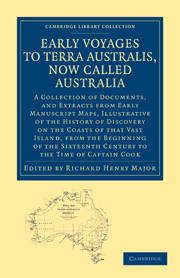 Early Voyages to Terra Australis, Now Called Australia
Early Voyages to Terra Australis, Now Called Australia Published online by Cambridge University Press: 05 February 2013
On the morning of the 29th December (1696) at half-past two o'clock, we discovered the South Land, to east northeast of us at from four to five miles distance. We found the country low, the main coast stretching from south to north. Our people observed a remarkable fish here, about two feet long, with a round head and a sort of arms and legs and even something like hands. They found also several stems of plants. They cast anchor in from fourteen to fifteen fathoms. At nearly half a league from the island on the south side they had good holding ground. The wind south-west by south.
On the 30th December we took counsel, and then with our guns on our arms put the shallop afloat and with the chief pilot I went on shore to look round the island. We rowed round to the east corner of the island about a cannon shot distance from the coast, and found there two fathoms water with muddy bottom, filled with shells, and occasionally a sandy bottom. Proceeding a little further, we sounded the little island bearing to the south of us, and the western most point of the large one bearing north-west of us; and we found five fathoms, and good and bad bottom by turns. We afterwards sounded north, the westernmost point bearing N. W. and by W. of us, and the little island S. W., and had as before five fathoms.
To save this book to your Kindle, first ensure [email protected] is added to your Approved Personal Document E-mail List under your Personal Document Settings on the Manage Your Content and Devices page of your Amazon account. Then enter the ‘name’ part of your Kindle email address below. Find out more about saving to your Kindle.
Note you can select to save to either the @free.kindle.com or @kindle.com variations. ‘@free.kindle.com’ emails are free but can only be saved to your device when it is connected to wi-fi. ‘@kindle.com’ emails can be delivered even when you are not connected to wi-fi, but note that service fees apply.
Find out more about the Kindle Personal Document Service.
To save content items to your account, please confirm that you agree to abide by our usage policies. If this is the first time you use this feature, you will be asked to authorise Cambridge Core to connect with your account. Find out more about saving content to Dropbox.
To save content items to your account, please confirm that you agree to abide by our usage policies. If this is the first time you use this feature, you will be asked to authorise Cambridge Core to connect with your account. Find out more about saving content to Google Drive.